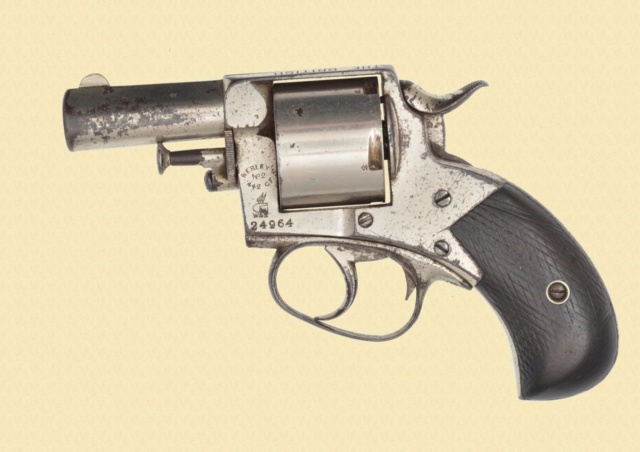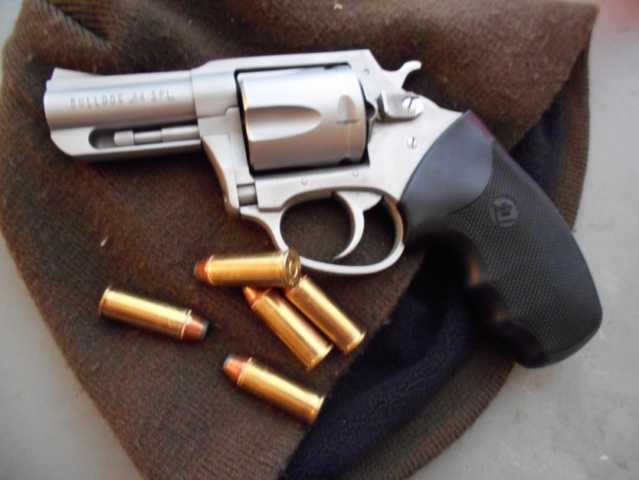In
this article I discussed the "snubby" revolver:
The compact revolver, typified by the J-frame S&W, occupies such a significant niche that it still found a place in the armoury of such dedicated aotopistol aficionados such as Jeff Cooper, Evan Marshall, Marcus Wynne, Mas Ayoob and Shane Ghosa.
My particular choice was the S&W M60, a stainless version of the famed “Chiefs' Special”, which I equipped with Bianchi Lightning grips, which shrouded the hammer.
My main use for the snubby was as learning gun for new shooters. Starting with mild wadcutters the newbie would have a gentle introduction before graduating to full power loads.
Another aspect was that we were doing a great deal of scenario training, which, in those pre-Simumition days, required wax bullets. The revolver is de rigueur for this, and we went through countless evolutions refining tactics as we shot each other with wax [actually plasticine] rounds.
When we started opening our bodyguard courses to the civilian market, I needed a second revolver for the wax-bullet scenario work, and so added a Charter Arms .44 special Bulldog to my collection.  [My snubbies being used on a Bodyguard Course]
[My snubbies being used on a Bodyguard Course]In this article I will delve a bit deeper into the Bulldog.
My good friend Mac, who was our local gunsmith [as well as being a good shooter] had an old Webley Mk iv in .455 and had the idea of chopping it down to a snubby, rather like the early Webley Bulldog which Sherlock Holmes would slip into a pocket when the game's afoot *. That Webley snubby concept is intriguing, a compact pistol, convenient to to carry and conceal, firing a big-bore bullet at medium velocity. As we will see, that concept is still relevant today.
 [Webley Bulldog]MONSTER STOPPER
[Webley Bulldog]MONSTER STOPPERI first really became aware of the Charter-Arms Bulldog in Thomas Harris' fantastic
Red DragonOdd arm for a fed. It was a Bullldog .44 Special, short and ugly with its startling big bore. It had been extensively modified by Mag Na Port. The barrel was vented near the muzzle to help keep the muzzle down on recoil, the hammer was bobbed and it had a good set of fat grips. He suspected it was throated for the speedloader. One hell of a mean pistol when it was loaded with what the fed had waiting. He wondered how the woman would stand up to it. The ammunition on the stand beside them was an interesting progression. First there was a box of lightly loaded wadcutters. Then came regular service hardball , and last was something the rangemaster had read much about but had rarely seen. A row of Glaser Safety Slugs. The tips looked like pencil erasers. Behind each tip was a copper jacket containing number-twelve shot suspended in liquid Teflon. The light projectile was designed to fly at tremendous velocity, smash into the target and release the shot. In meat the results were devastating. The rangemaster even recalled the figures. Ninety Glasers had been fired at men so far. Al ninety were instant one-shot stops.........He had been back in the tower for some time when he heard the hellish racket of the Glasers going off. She was pumping al five. It was not standard federal practice. The rangemaster wondered what in God's name they saw in the silhouette that it would take five Glasers to kill .As mentioned I acquired a Charter and started training with it, both in wax-bullet scenario work, as well as regular live ammo drills. This proved fine for plasticine, but shooting full power .44 special loads in that light frame was not a pleasant task..... and this to a chap who started out firing full-bat .357s in a S&W K-frame! Recoil is not just about foot/pounds but how that energy is transmitted to the hand, and for some reason that Bulldog was particularly painful to shoot.
 [The Charter Arms Bulldog]
[The Charter Arms Bulldog]Colonel Cooper admired the idea of the Bulldog, writing in
Cooper on Handguns "This concept long admired by shooters but conscientiously ignored by gunmakers is one of the best in weaponry. Charter deserves full credit for bringing it out, dusting it off and scooping the industry. It's a crying shame, however, that they chose to treat it as a bargain basement specialThe Colonel evaluated the pistol as follows:
Good pointsConcept
Sight visibility
Offset bolt cut
Stock design
Modern action [transfer bar and vertical stripping]
Balance and "feel"
Single-action pull
Bad pointsWorkmanship and materials
Front sight hook
Inadequate extractor length
Stock execution [edges don't mate]
Cylinder latch
Exposed rod
Very weak yoke
Double-action pull
Grooved trigger
Flimsy bolt.

At the time, however, there was no real competitor, until some years later, S&W brought out their M-24/3 snubby in .44 spl.
Despite the faults, the Charter achieved niche popularity. and Ed Lovette told me he carried a pair of Bulldogs on Government work.
 [.44 Special ammo]
[.44 Special ammo]Despite the pain I could shoot the Charter with decent accuracy, and it was, to be fair, a potent defensive handgun. Back when the Charter was introduced, we must remember that the revolver was the law enforcement handgun; and there was a distinct market for off-duty/backup options. Not long after the Charter was launched Star produced their PD a compact .45 autopistol. Personally, I found the
Star PD of more use than the Bulldog. I could shoot it better and it hit just as hard. However, for the majority of shooters back then, especially police officers, the Charter still made sense.
 [With PJ Decision target on Bodyguard Course]THE POCKET PISTOL
[With PJ Decision target on Bodyguard Course]THE POCKET PISTOLA use for the generic snubby, is as a pocket pistol. Police use in topcoat/bomber pocket on vehicle stop. The officer can approach with his hand on the pistol, while appearing non-threatening. This has bled over into a civilian application, discreetly having hand on pocketed pistol in bad areas, giving the fastest reaction to surprise violent attack. Daryl Bolke categorizes the snubby as the "Rule One Gun" This refers to the first rule of gunfight survival "have a gun" and the snubby is the pistol you can carry in situations where a bigger, better weapon is impractical.
 [My S&W M-60 snubby]
[My S&W M-60 snubby]The best design for a pocket pistol has a shrouded hammer to avoid snags. Bobbing the hammer is another alternative, In this application the snubby is superior to almost any autopistol.
 [The Bulldog is available in this hammerless variant]FINAL THOUGHTS
[The Bulldog is available in this hammerless variant]FINAL THOUGHTSIn recent years the Charter has faded from the scene. Other manufacturers offered alternatives, and various improvements in .38spl ammo made carrying that calibre a more attractive proposition. In the 1980s a few custom smiths rechambered .38 snubbies to .357. I fired one in Missouri and it was even more unpleasent to shoot than the Bulldog! Eventually the manufacturers worked out the metallurgy and pistols such as the Ruger Sp-101 were offered, became popular and to an extent replaced the big-bore snubby for many.
There are still, however, serious shooters who continue to embrace the concept of a big-bore snubby, and a concept, dating back to the days of the British Raj and the American West, lives on.
POSTSCRIPT
By chance, just after I posted this article I bumped into my old shooting buddy Mac. He told me that he had actually modified a couple of Webleys as described, including a MkV which he rebored from .455 to .45acp, for use with full moon clips. A great personal protection package.
------
For further information go to the
Charter Arms website[/i]
